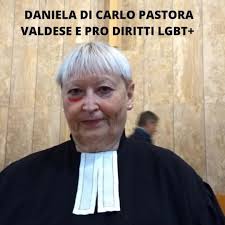The following article was written for the Presbyterian News Service by Beth Waltemath. It is shared here with permission.
“Gender violence is an evil that must be stopped collectively,” said the Rev. Daniela Di Carlo, pastor of the Waldensian Church in Milan and organizer of national prayer vigils across Italy in honor of the International Day Against Homophobia, Biphobia and Transphobia, which fell on May 17.
The Waldensian Evangelical Church in Italy has been vocal on issues relating to LGBTQIA+ equity and inclusion.
Di Carlo believes that forming alliances between churches can build a world where differences are resources. She serves on the Italian National Commission on Faith, Gender and Sexuality, an ecumenical Protestant advocacy group.
“Every person is deeply loved by God and was created in God’s image and likeness,” said Di Carlo. “Women, people with disabilities, the LGBTQ+ community, and all those who do not fit into the norm can help churches and theologies become inclusive.”
According to Di Carlo, vigils, prayers and services dedicated to the victims of homobitransphobia remind people of faith of the hope they must have and the work they must do to end violence and create a world of welcome and love. “As we work together for the day in which no woman is killed, no gay rejected by his family, no transgender person attacked in the street, no differently-abled person mocked, let us pray and begin to build, with the help of Jesus Christ, that possible world made of welcome and love,” she said.
In addition to planning and promoting the May 17 vigils, Di Carlo has developed an ecumenical liturgy and a preaching resource to be used by churches across the world in honor of the day which can be found among other ecumenical resources on pcusa.org.
The International Day against Homophobia, Biphobia and Transphobia was established in 2005 to commemorate the day in 1990 when the World Health Organization removed homosexuality from the International Classification of Diseases. Like the PC(USA), Di Carlo explained that the Waldensian Evangelical Church in Italy has a long history of advocating for gender and sexuality issues dating back to the 1970s, when it began to speak at the Agape Ecumenical Center about faith and feminism in 1974 and later faith and homosexuality in 1980. In 2010, the Waldensian Evangelical Church Synod in Italy decided to bless same-sex couples. As the 2025 vigil draws attention to gender- and sexuality-based fear and discrimination, Di Carlo says the organizers are focused on issues that transgender people face in Southern Europe.
A responsive greeting opens the liturgical resource for these international vigils with a litany that calls all Christ’s disciples into the work of faithful witness for God’s just and inclusive realm:
“Ci chiami, come hai chiamato le donne alla croce. Ci chiami, come hai chiamato I dodici … Ci chiami, come hai chiamato la folla, Ci chiami, come hai chiamato I tuoi amici …”
(You call us as you called the women to the cross. You call us as you called the twelve. You call us as you called the crowd … You call us as you called your friends …)
“Mentre ci muoviamo, concedici il coraggio e la grazia di esserti testimoni fedeli.”
(As we move, grant us the courage and the grace to be faithful witnesses to you.)
“A lot of churches in Italy organize an annual vigil of May 17 as a public event of witness by those Protestant churches combating homobitransphobia,” said Luciano Kovacs, international global ecumenical liaison in the Interim United Agency of the PC(USA). Last year, Kovacs and others invited Di Carlo to serve on the steering committee of the Rainbow Pilgrims of Faith, an informal network of members of churches within the World Council of Churches that advocates on behalf of LGBTQIA+ equity. Kovacs, who supports the mission partnerships and networks of the PC(USA) in Europe and the Middle East, attended the May 17 vigil in the Waldensian Evangelical Church in his hometown of Turin, Italy.

